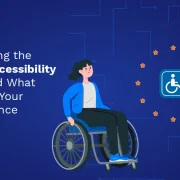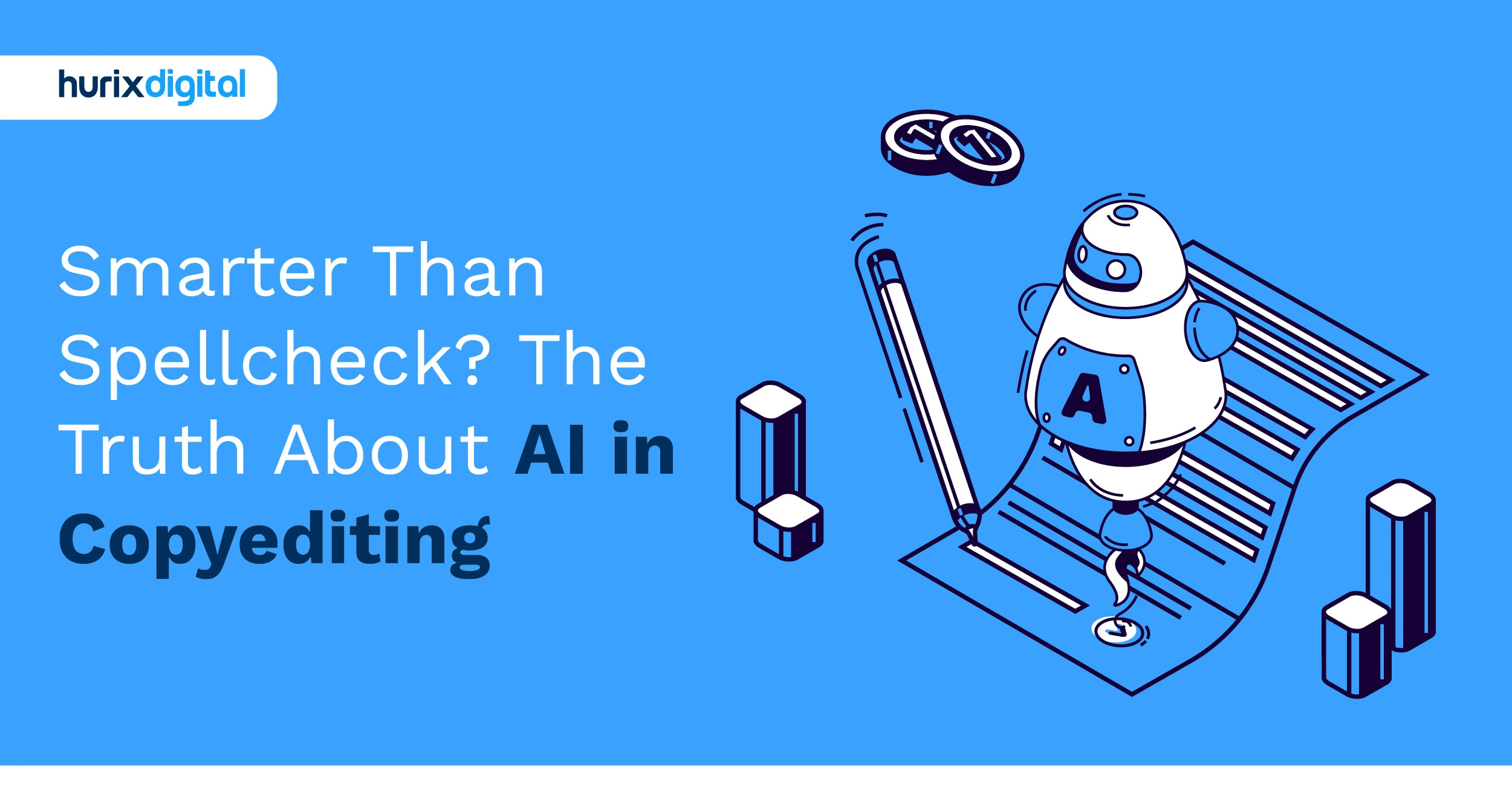
Smarter Than Spellcheck The Truth About AI in Copyediting
The conversations around artificial intelligence’s revolutionary capacities are endless. The recently launched ChatGPT’s human-like faculties are scary for some and exciting for others. Although all industries benefit from AI in one way or another, the emergence of AI certainly threatens job security.
AI’s proliferation in this sector has been groundbreaking, particularly in AI copy editing and AI-generated content. Studies suggest that the global AI market is set to expand twentyfold by 2030, up to nearly $2 trillion. This surge highlights AI’s integral role in shaping the future of various sectors, including the education and content creation industries.
The debate of AI vs. human copyeditors in the publishing industry is ongoing. While there are some advantages of utilizing AI in copyediting, there are also some major drawbacks. The solution to this complex debate lies in striking the right balance between artificial intelligence and human copyeditors.
Automation in copyediting should be fully employed for efficiency, consistency, and cost-effectiveness. On the other hand, human copyeditors should be prized for their contextual understanding, subject expertise, and creativity. Even though artificial intelligence utilizes preloaded data, guidelines, and feedback, it can never mimic a human’s editorial decisions.
If you are striving to strike the right balance between humans and artificial intelligence in copyediting, you are at the right place. This comprehensive guide covers everything there is to know about AI vs. human copyeditors to facilitate positive decision-making and output.
Table of Contents:
- What is Copyediting?
- Evolution of Copyediting
- Why is Copyediting Important?
- The True Power of AI in Copyediting
- Ethical Challenges in AI Copyediting
- Solutions for Ethical Challenges
- What are the Advantages of AI in Copyediting?
- What are the Disadvantages of AI in Copyediting?
- How to Strike the Right Balance Between Humans and AI in Copyediting?
- What are the Top 6 Emerging AI Trends in Copyediting?
- AI Copyediting Services
- Top 6 AI-Powered Copyediting Tools
- The End Note
What is Copyediting?
Copyediting is the simple process of enhancing the accuracy of written content by correcting its grammar, spelling and punctuation, syntax, sentence structure, and other mistakes. The aim is to make the content more articulate and consistent.
Another important step of copyediting includes checking for plagiarism and cross-referencing all the information mentioned in the write-up. Sometimes, unintentional plagiarism can occur, which must be rectified to enhance its correctness and quality.
Evolution of Copyediting
In the 19th century, copyediting was done manually by people known as copyeditors, who provided copyediting services for hand-written manuscripts. Copyeditors corrected grammar, punctuation, spelling, and syntax errors.
With the advent of desktop publishing, copyediting shifted to computers. Copyeditors took to editing the copies of typed or printed manuscripts for books or research papers on text processors like Microsoft Word.
As more advances took place, leading to the emergence of digital publishing, the responsibilities of copyeditors expanded. Now, they have to review content for different formats and channels, like web pages and social media, and even take care of aspects like hyperlinking, formatting, factual accuracy, and multimedia elements.
With the emergence of AI, advanced tools have emerged to streamline the copyediting process and help copyeditors ensure that the copies are clear, consistent, coherent, and correct in context.
Why is Copyediting Important?
Copyediting is an indispensable process, especially if you want your publication to be in the market. Good editing brings a logical flow to your content and polishes your draft for all errors so you can send it to a publisher.
Nowadays, automated copyediting helps produce a refined draft and significantly raises your odds of selection by the publisher, thus expediting your journey to becoming a published author.
The True Power of AI in Copyediting
How much time do you think a copyeditor spends on editing a piece of 1000 words? It takes approximately 35 minutes for an experienced copyeditor and proofreader to edit it efficiently.
How much time do you think AI takes to copyedit a content piece of 1000 words? Just a few minutes. Yes, you read it right. It merely takes AI tools a few minutes to copyedit a content piece of either 1000 words or 10,000 words. As a result, copyediting is the most common use of AI tools and technology.
However, there is also the danger of automated copyediting and AI-powered proofreading. Over-reliance on automation tools discourages copyeditors and proofreaders from thinking critically and creatively. Additionally, AI tools are not humans. They just mimic humans.
They sometimes fail to deliver content with the same contextual understanding as a human. Therefore, relying only on AI for copyediting can create a false sense of security which can be extremely detrimental in the long run.
It is important to balance AI-powered copyediting and human copyediting to mitigate these dangers. This will allow the right amalgamation of expertise from both ends, resulting in better clarity, quality, and integrity of the content.
Ethical Challenges in AI Copyediting
Ever since the use of AI in copyediting, several ethical concerns and challenges have been raised, such as the following:
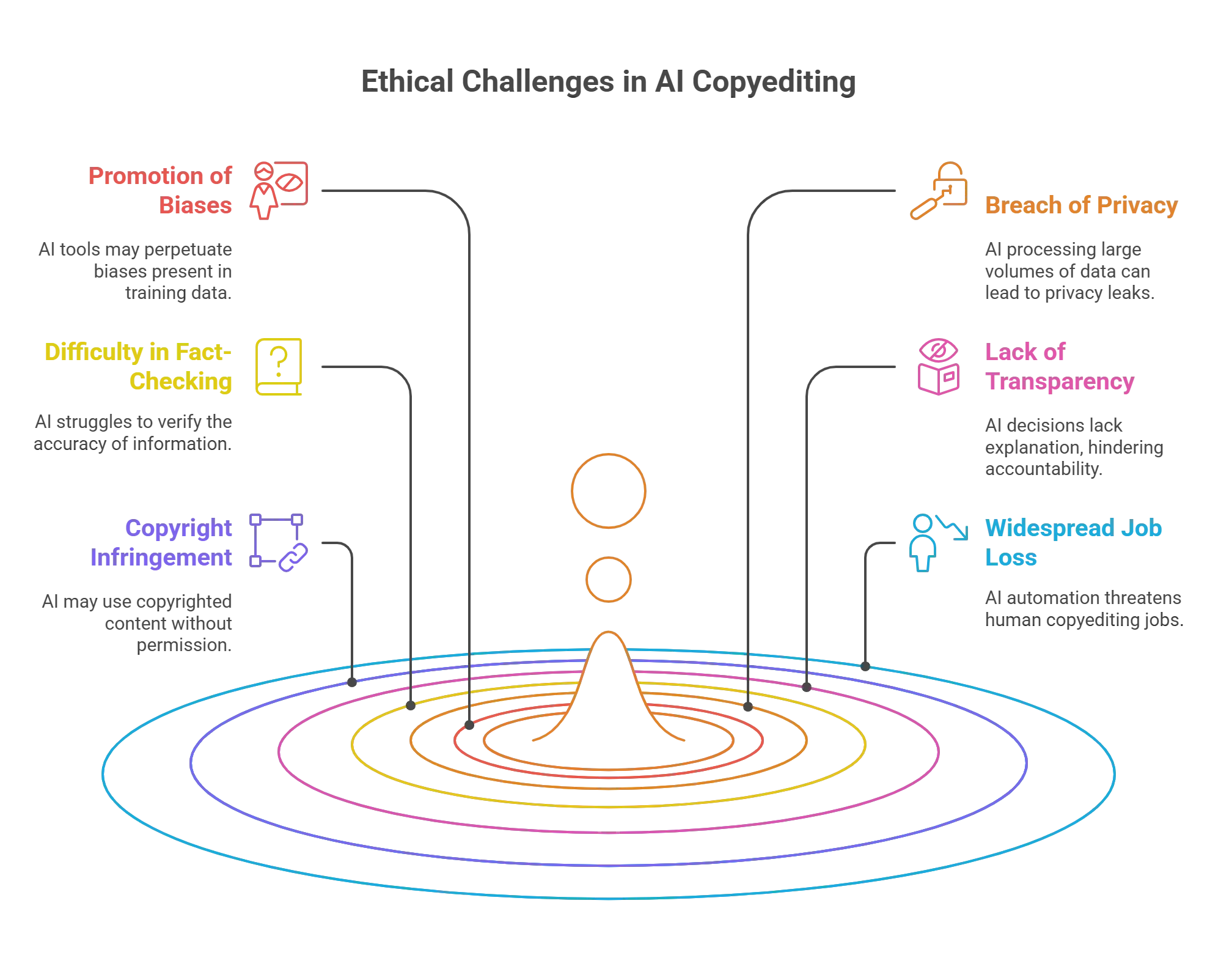
1. Promotion of Biases
AI algorithms take information from a large amount of preset training data. If this training data contains biases, the results produced by AI tools will be biased. Thus, when copyediting, AI tools can make changes in the language that are discriminatory to a specific section of the population. In addition, they may not catch onto the discipline-specific nuances in a non-fiction book, thus leading to mistakes and misrepresentations of the information.
2. Breach of Privacy
To copyedit, AI tools get access to sensitive or personal information. Since AI tools process large volumes of content at a time, they can unintentionally reveal or leak confidential information from user data, thus leading to a breach of privacy.
3. Difficulty in Fact-Checking
Fact-checking is an important part of copyediting, ensuring that only genuine and accurate information is included in the draft and published.
AI tools often have difficulty determining whether a statistic is true or accurate. Thus, they can lead to the publication of inaccurate information.
4. Lack of Transparency and Accountability
Whenever AI-powered copyediting tools work on a draft, they don’t provide explanations or reasoning behind their editing decisions, causing an utter lack of transparency and explainability. The latter makes it difficult to determine who is liable for spreading misinformation or erroneous facts – the author or the AI-powered editing tool – thus creating a lack of accountability.
5. Copyright Infringement
Copyediting requires changing parts of sentences and words to bring consistency to the tone and improve the readability of the content. When AI tools do this, they may use portions of sentences from external sources without giving them credit. As a result, AI tools can end up using copyrighted content without permission from the author, thus resulting in copyright infringement.
6. Widespread Job Loss
AI tools automate repetitive manual tasks, bring workflow efficiency, save time, and reduce costs. It is predicted that AI will replace 16% of the jobs in the US by 2025.
Since AI-based copyediting tools can edit copies of drafts more quickly and efficiently than human copyeditors, a huge risk of AI-driven tools replacing their jobs exists.
Solutions for Ethical Challenges
Now that you know about the ethical concerns surrounding artificial intelligence and copyediting, let’s discover their probable solutions.
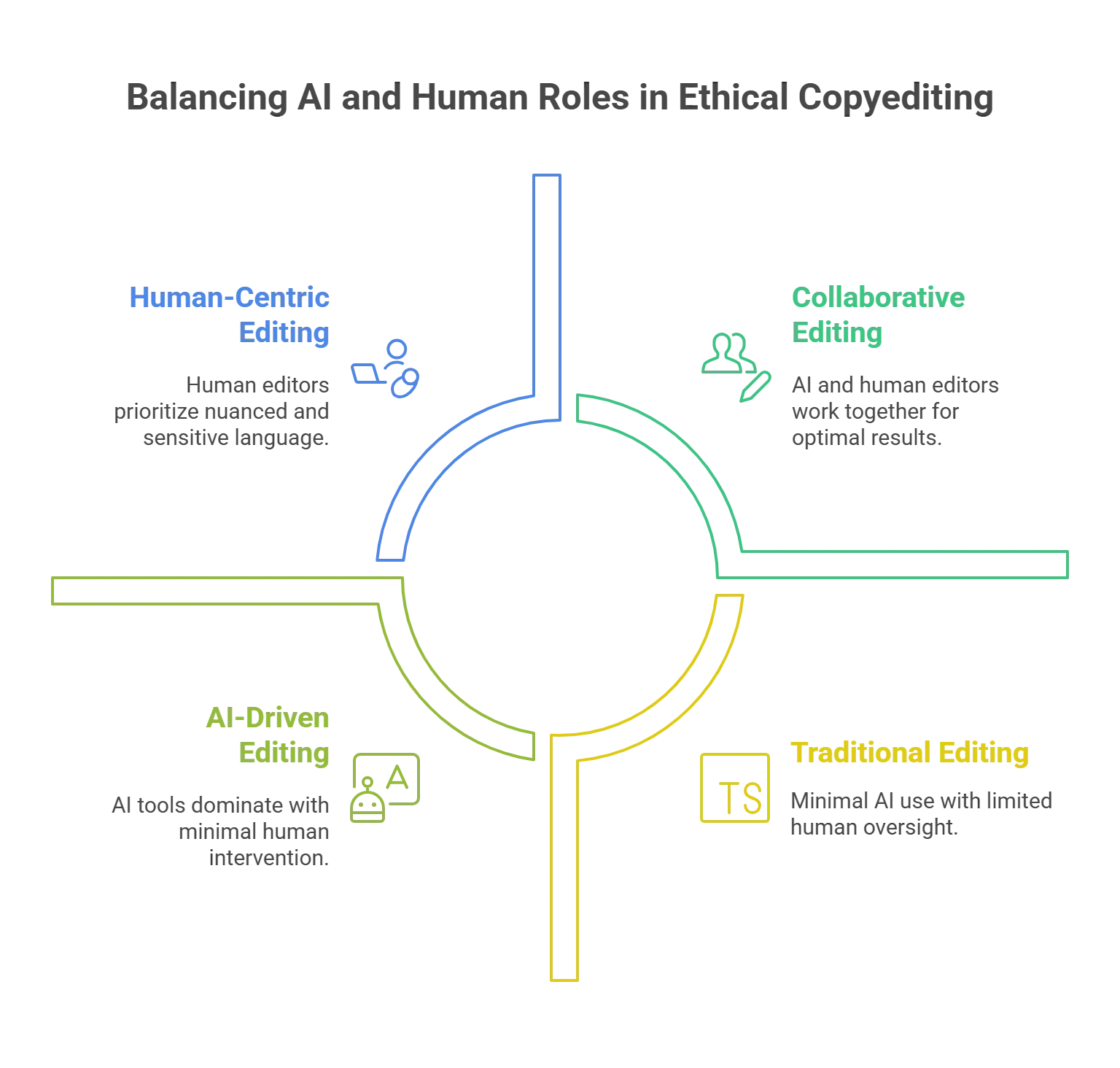
1. Inclusive Data and Regular Auditing
To ensure that AI-based copyediting is free from bias, the training data used by AI tools must be representative of the population. Taking data from different cultural, ethnic, and linguistic groups anonymously can create inclusive training data for AI tools to work with.
To further mitigate biases, conducting regular audits of the performance of AI editing tools is essential. This will help you determine whether the information is being handled sensitively and, if not, where improvement needs to occur.
2. Data Encryption and Transparency
AI editing tools should include strict data encryption measures, ensuring that user data remains protected, confidential, and accessible only to trusted personnel.
In addition, AI-based copyediting tools should indicate the areas they have edited, along with an explanation. This will help distinguish AI content from human-generated content and enable the author to take responsibility for the document’s final draft and published version.
3. Human Intervention
Human oversight and intervention are paramount to getting the best copyediting results. AI-powered editing tools should be seen as assistants rather than complete job over-takers. With the collaboration of AI tools and human copyeditors, the best decisions can be made to ensure that the language of discipline-specific texts is nuanced and sensitive, tone and style are consistent, accurate information is used, and proper formatting is done.
What are the Advantages of AI in Copyediting?
Now that you know it is important to strike the perfect balance between humans and AI, let us first begin by understanding the advantages of AI in copyediting:
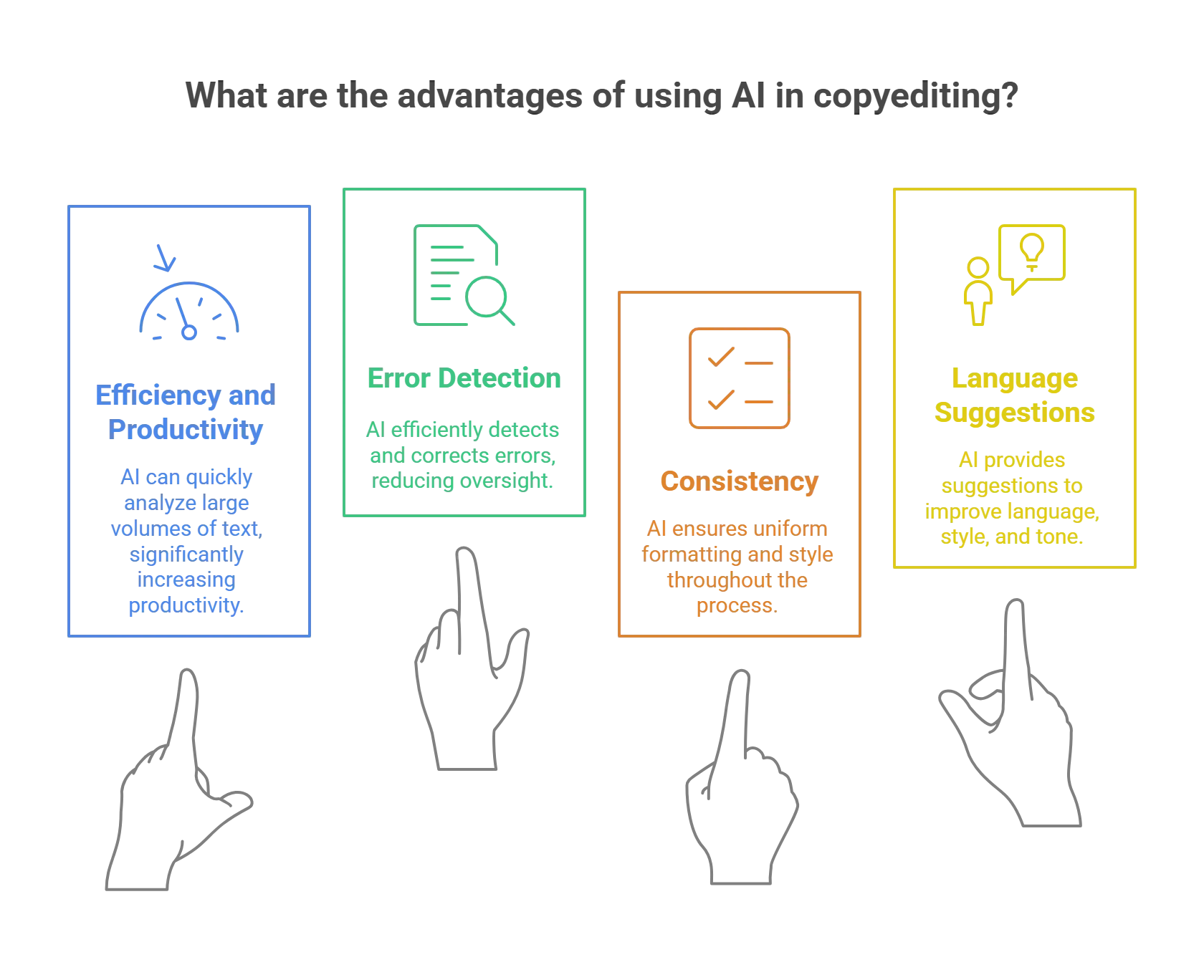
1. Efficiency and Productivity
It takes artificial intelligence much less time than a human to copyedit a piece of content thoroughly. AI-powered proofreading and AI-powered copyediting can analyze a large volume of text quickly, significantly increasing productivity. Such artificial intelligence tools for copyediting are very useful for publishing houses that work on tight deadlines and a high volume of content editing tasks.
2. Error Detection
Even human copyeditors can sometimes fail to detect errors in spelling, grammar, punctuation, syntax, etc. However, with AI in copyediting, chances of oversight are highly reduced as each irregularity is detected and corrected efficiently. AI can also suggest improvements to reduce such errors in the future.
3. Consistency
It is very important to maintain a uniform style of formatting while proofreading and copyediting. AI tools automatically apply algorithms and guidelines while copyediting to ensure consistency throughout the process. For instance, if the content targets the US audience, the algorithm will apply the US English spelling in the content.
4. Language, Style, and Tone Suggestions
Copyediting AI tools are intuitive and consistent. While editing the task, they can suggest improving the text’s language, style, and tone to enhance the reader experience and readability. For instance, it can offer alternative word choices or rephrase sentences to ensure clarity and improve the overall quality.
What are the Disadvantages of AI in Copyediting?
As with the emergence of any new technology, AI in copyediting currently faces several challenges, including the following:
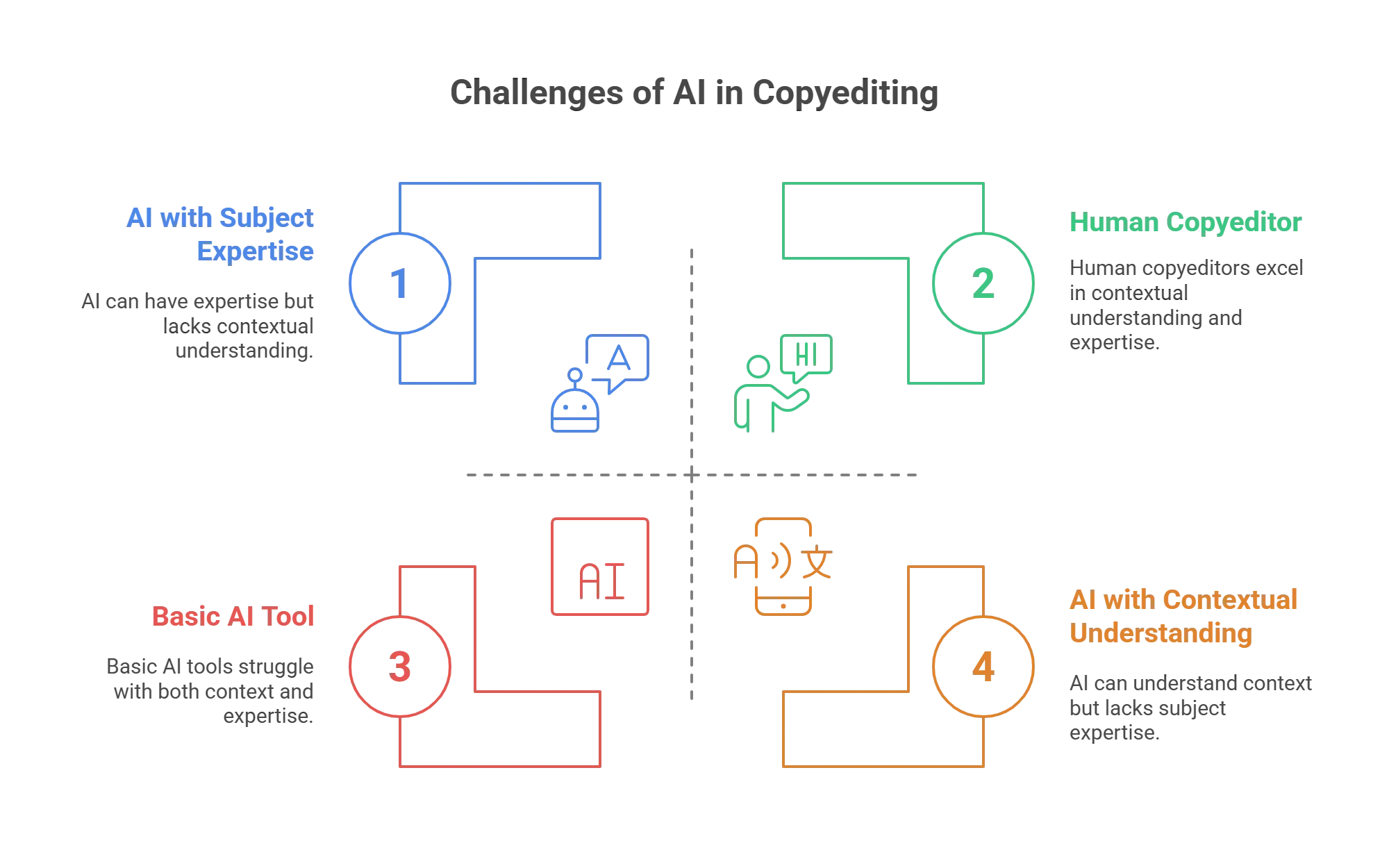
1. Lack of Contextual Understanding
Even highly advanced AI tools cannot understand contextual nuances as well as humans can. They can easily misinterpret cultural meanings, phrases, expressions, and idioms. When they indulge in translation practices to understand the intended meaning, the literal translations over cultural translations lose sense.
2. Lack of Subject Matter Expertise
Copyeditors have in-depth subject matter expertise due to years of practice and knowledge. Artificial intelligence’s preloaded data and information cannot defeat a human copyeditor’s domain-specific experience and knowledge. Often, AI in copyediting fails to accurately understand and edit field-specific writing, such as academic writing, legal writing, etc.
3. Absence of Emotional Intelligence and Sensitivity
The first robot, Sophia, to be granted citizenship easily said, “Ok. I will destroy humans,” when asked if she wanted to destroy humans. This demonstrates that artificial intelligence lacks the sensitivity and emotional intelligence to make ethical and moral choices. In the copyediting landscape, artificial intelligence cannot understand cultural sensitivities and certain language choices, and neither can humans.
4. AI and Data Biases
Artificially intelligent models are data-driven to amplify their analytical and decision-making potential. However, if the data used to train the AI system is biased, the outcome will also be biased. For instance, if AI has been fed historical data that stereotypes a certain community, the AI system will reinforce these biases in all the results it generates. Consequently, promoting a transparent and ethical data-driven development of AI is important.
How to Strike the Right Balance Between Humans and AI in Copyediting?
The only way to fully leverage the potential of AI in copyediting is by striking the right balance between AI and humans. Here are some strategies you can keep in mind to accomplish this much-needed balance:
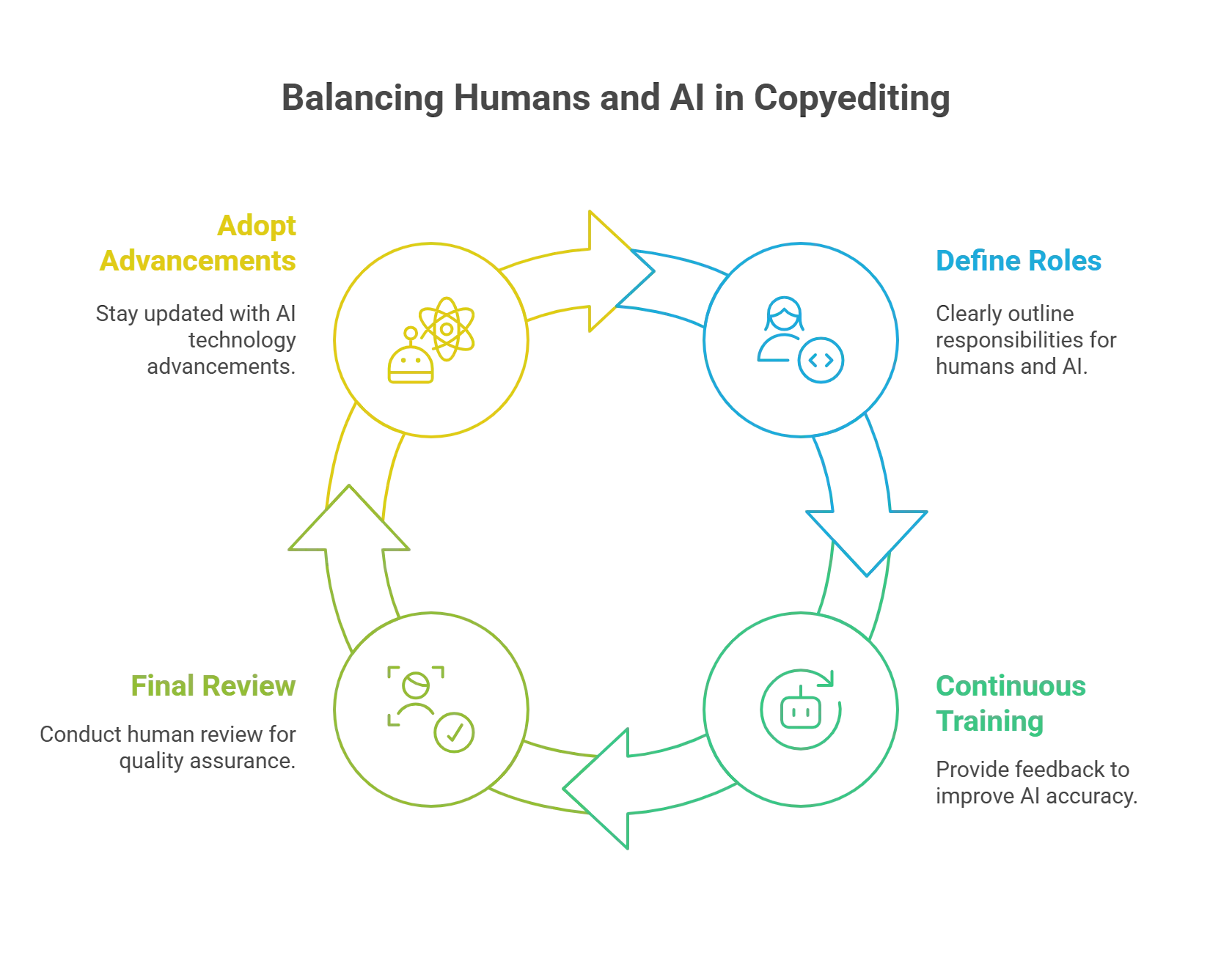
1. Clearly Define the Roles and Responsibilities
The first strategy is to consider the roles and responsibilities of human editors and AI-driven tools. For instance, AI copyediting can perform the basic steps of copyediting, like grammar and spelling checks. In contrast, human editors can perform more complex and nuanced tasks, like contextual revisions, linguistic changes, etc.
2. Continuous Training and Feedback
Ensure that human editors continuously fine-tune the AI tools and technologies. They should constantly provide feedback and suggestions on accuracy and efficiency to improve the AI model.
3. Final Review for Quality Control
Before a draft is considered to be successfully copyedited, it must be checked one last time by a human editor. This will establish a robust quality check process and ensure all the guidelines are followed efficiently.
4. Adoption of the Latest AI Advancements
The artificial intelligence landscape is developing rapidly. Consequently, staying updated regarding improved capabilities and functionalities is important to leveraging its full potential. Evaluate your publishing workflow against the available AI tools to establish the necessary technological adjustments.
What are the Top 6 Emerging AI Trends in Copyediting?
Now that you are familiar with the basics of copyediting, let’s delve into the upcoming trends involving artificial intelligence and copyediting.
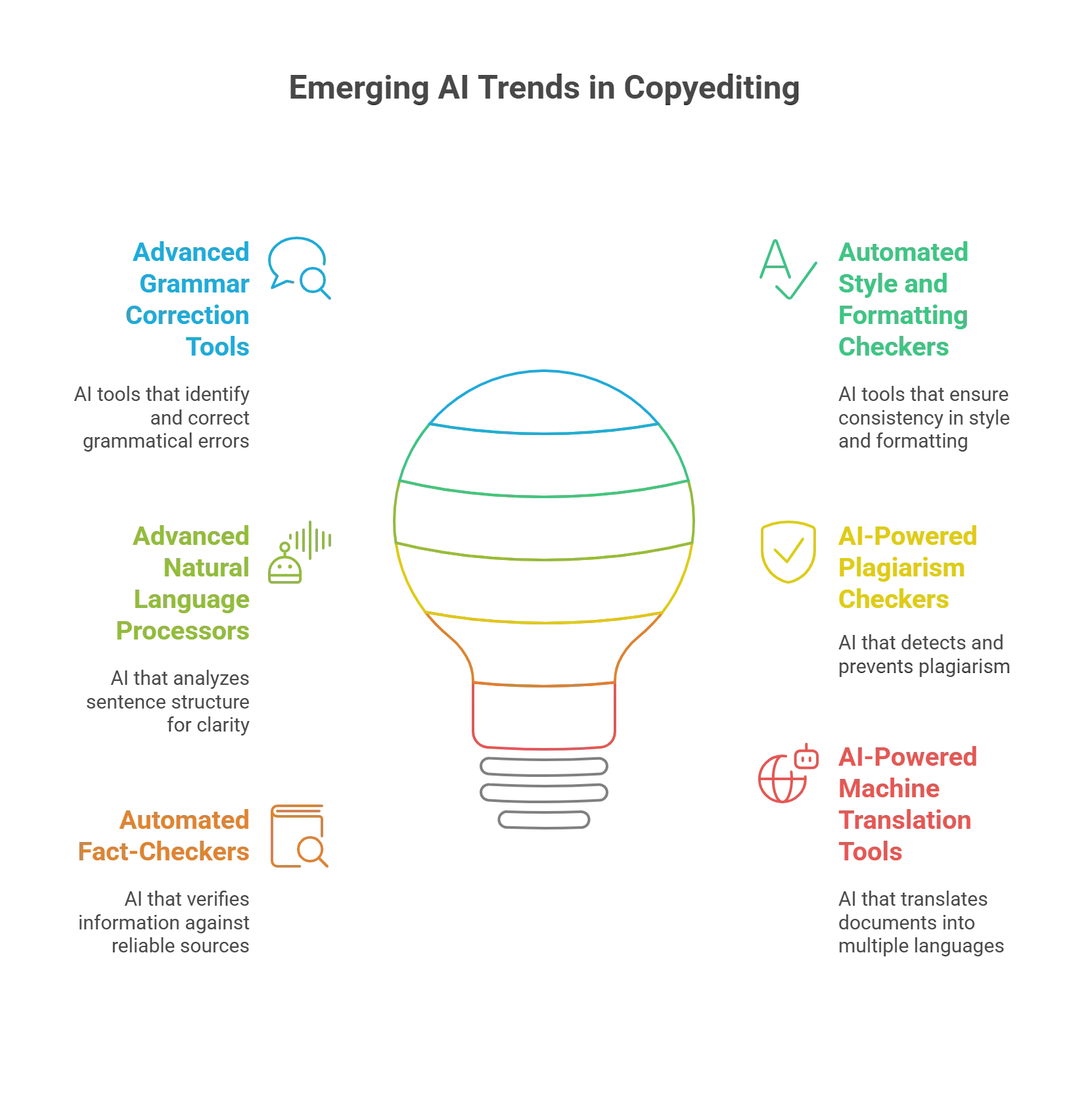
1. Advanced Grammar Correction Tools
Correct grammar is a crucial component of editing any document. While grammatical errors can make your piece of writing difficult to read and even drive people away, correct grammar improves the readability and clarity of your message.
Owing to the importance of correct grammar, AI-powered grammar correction tools are emerging, similar to the likes of tools like Grammarly. These tools use advanced AI algorithms to scan your document and spot typos, punctuation, and other grammar mistakes.
Once they have identified the errors, they suggest corrections to improve your document’s clarity and coherence.
2. Automated Style and Formatting Checkers
Good style and proper formatting can make your document look professional and visually appealing. However, ensuring consistency in style and formatting can be a tedious and time-consuming task for copy editors.
Fortunately, many AI tools are being developed to automate these tasks. AI tools use machine learning for copyediting processes and run checks through your document’s front, body, and end matter to spot inconsistencies in style, tone, and formatting.
Once they find them, they correct them according to your preferred style guide.
3. Advanced Natural Language Processors
One of the emerging technologies in copyediting includes advanced natural language processors. With their ability to analyze the sentences and their structures, they can help copyeditors identify the paragraphs and sentences that are unclear and thus need further clarification.
Their capability of making sense of the context further enables them to develop alternative phrases that can help you improve the contextual understanding of your document.
4. AI-Powered Plagiarism Checkers
There is an unlimited amount of online content available today, and as a result, you could easily end up unintentionally committing plagiarism.
In this scenario, only AI-powered plagiarism checkers can save you. AI-based plagiarism checkers can compare your document with the extensive database of published documents and flag plagiarized content.
If they find the latter, they provide you with alternate ways of writing the same content to improve your document’s integrity and originality.
5. Automated Fact-Checkers
Inaccurate information can gravely harm the credibility of your document. To prevent this, using automated fact-checkers can be very beneficial.
They perform fact-checking of claims, statistics, measurement values, references, etc., against reliable and verified sources and databases. If a claim or a reference turns out to be inaccurate, they direct you to the correct claim or citation. This ensures that the information present in your document is accurate and up-to-date.
6. AI-Powered Machine Translation Tools
In a world of globalization on the rise, documents are usually published in different languages today. As a result, publishers require copyediting in numerous languages.
To help with this, AI-powered machine translation tools can convert the content of your document into whichever language your publisher requires. Further, other AI-based tools can help your copyeditors maintain accuracy and consistency across different document editions.
Overall, these AI-based tools help eliminate language barriers and increase the odds of acquiring a global readership.
AI Copyediting Services
Now that the importance of balancing AI copyediting and human copyediting has been established, let’s examine the features of AI copyediting services:
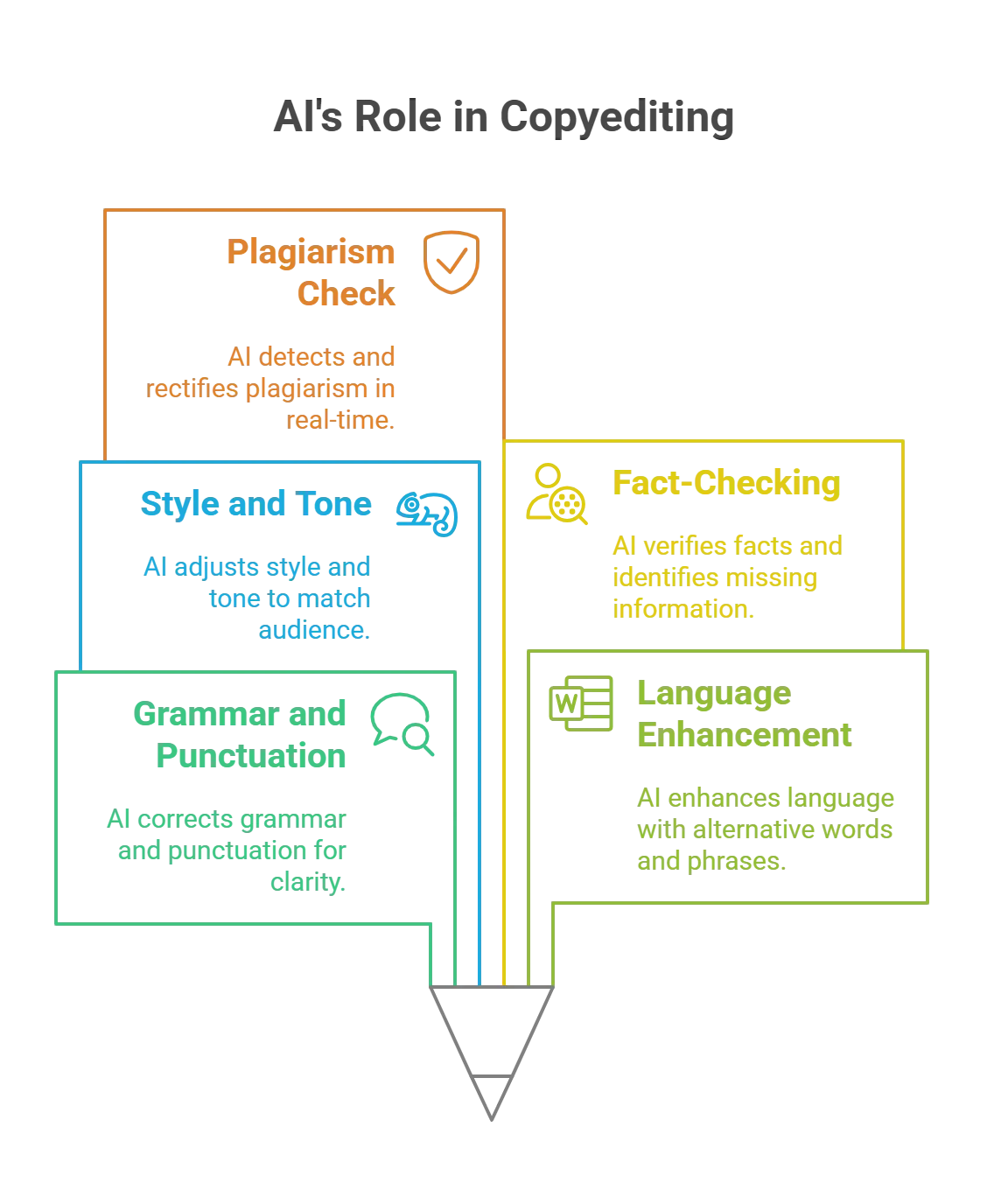
1. Grammar, Spelling, and Punctuation
AI uses sophisticated algorithms to detect and highlight grammar and spelling mistakes in a content piece. It can then offer corrections to rectify them, saving you from the effort of manually proofreading and copyediting it.
Punctuation is another minor element that is often overlooked. A lack of punctuation can sometimes change the effect and context of the sentence. Artificial intelligence can greatly enhance the quality of the content by flagging grammar, spelling, and punctuation-related inconsistencies.
2. Language Enhancement
AI tools and technologies are trained on an immense number of texts, data, and vocabulary. Subsequently, it can suggest numerous alternative words and phrases for a content piece to improve its readability.
While suggesting new phrases, it automatically avoids repetitions to keep the content consistent and appropriate.
3. Style and Tone
AI can analyze the style and tone of a content piece by comparing it against previously fed style guides and reference material. You can also instruct the AI tool, and it will modify the piece accordingly.
For instance, if you want to change the tone of a piece from casual to formal to reach the appropriate audience, you can command AI to do it. Additionally, AI can also make genre-specific changes. It can edit academic articles in a polite and formal tone, whereas newspaper articles are written in a conversational tone.
It is important to remember that AI will only suggest these changes and edits. You have the final decision-making authority and can choose to incorporate them.
4. Fact-Checking and Reference Verification
A well-researched article contains information and statistical data from various sources, including new articles, publications, review articles, video content, etc.
A copyeditor is responsible for cross-checking the information and doing robust fact-checking. Inaccurate information can lead to a variety of misinformation problems.
With AI, real-time fact-checking can be done quickly and efficiently. It can not only identify incorrect information but also identify missing information (if any). Additionally, AI can also indulge in plausibility evaluation. It will automatically detect highly misleading and implausible sentences.
5. Plagiarism Check
Intentional or unintentional plagiarism in a piece of content can lead to problems related to intellectual property theft. AI tools and technologies are designed to detect and rectify real-time plagiarism by suggesting ethical writing practices.
AI can also identify the source to help you analyze the plagiarized material closely. You can then compare both content pieces to understand and fix the plagiarism-related problem. It also makes it easier to correctly cite the relevant information and give the writer the due credit.
Top 6 AI-Powered Copyediting Tools
Let’s see the best AI-powered tools for your needs:
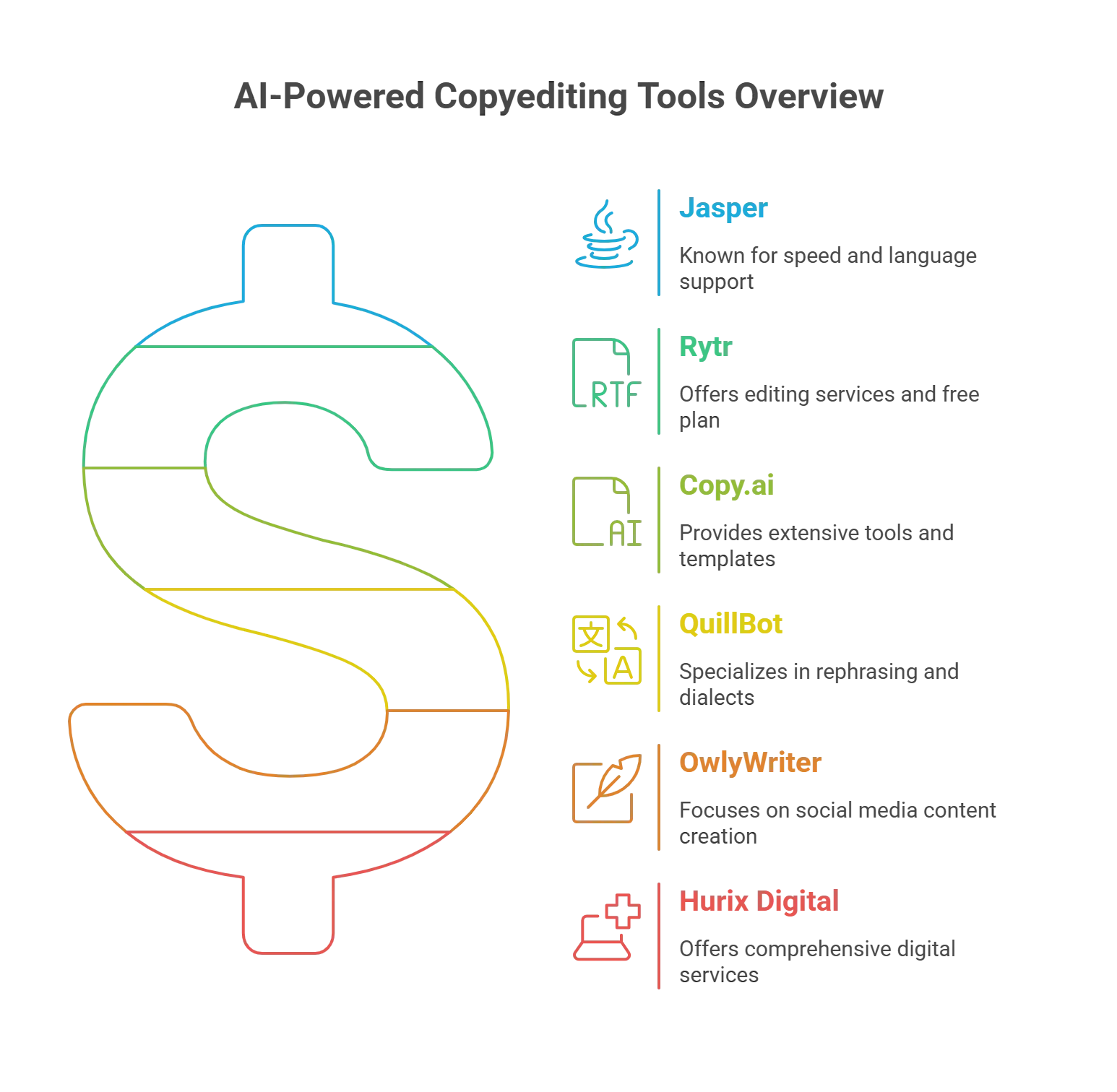
1. Jasper
Jasper is a powerful AI tool that allows copywriters and copyeditors to do their job five times faster. It can aid in writing and editing content like blog articles, social media posts, newsletters, marketing emails, review articles, and more. Additionally, it is available in more than 30 languages, making it easier for writers and editors to work with a language in which they have little or no proficiency.
Due to its affordable pricing and wide functionality, it is suitable for both professional creators and beginners. The basic subscription plan starts at $49/month if paid monthly and $39/month if paid annually.
- Search engine optimization
- Paraphrasing and rephrasing
- + language support
- Browser extension
- Language Translation
2. Rytr
This platform is trusted by more than 6,500,000 copywriters, entrepreneurs, and marketers. Depending on the creator’s needs, it is designed to curate both short-form and long-form content. One major highlight of Rytr is its editing services right on the platform, saving the editor from the hassle of copying the content to a different platform.
Rytr has a free plan that can generate up to 10,000 characters per month with a built-in plagiarism checker. The paid plans start at $9/month and can go up to $29/month. The unlimited plan can generate unlimited characters per month and has additional features like a dedicated account manager, priority email, and chat support.
- + language support
- + writing tones
- + use cases
- Six creativity levels
- Paraphrasing and rephrasing
- Readability meter check
- Image generation
- Browser extension
3. Copy.ai
With over 90+ tools and templates, Copy.ai helps creators write and edit content in minutes. To create and edit with copy.ai, you have to enter your project, provide the platform with some context on the points you want to be covered, and then let the AI generator work for you. Lastly, you can also edit, polish, and publish with the platform.
Due to its professional-level proficiency, it has a trusted customer base of famous brands like Microsoft, eBay, Nestle, and Ogilvy. It comes in a free and pro plan of $36/month with unlimited word generation capacity.
- Free writing templates
- + languages
- Enterprise-level data security
- Free Demo
- Vast resource base
4. QuillBot
Quillbot is a trusted partner of many copyeditors for its copyediting services, easy access, and exceptional rephrasing capabilities. Unlike other AI platforms, Quillbot does not create content. However, it rephrases content in creative ways. Editors can also choose the tone and fluency of the desired rephrased content.
Additionally, it is available in four English dialects: US, UK, CA, and AU. It is trusted by more than 50 million users worldwide and helps writers and editors save 75% of the time spent on a project.
It comes in a free plan, and the subscription plan starts at $9.95/month if paid monthly and $4.17/month if paid annually.
- Summarizer
- Citation generator
- Translator
- Extension for Chrome, Word, and MacOS
- /7 help center
- Free demo and payment refund policy
5. OwlyWriter
OwlyWriter is an automated proofreading and copyediting AI tool that is highly appreciated for creating engaging social media posts. To write and edit posts, provide a brief prompt, select a tone, and let the platform do the work for you.
You can also utilize the platform to brainstorm posts and caption ideas quickly. Some of OwlyWriter’s trusted customers are Domino’s, Ikea, the University of Chicago, the World Health Organization, Allianz, etc.
Beginners may find OwlyWriter a little pricey, with its plan starting at $99/month. For enterprise and professional pricing plans, you can contact OwlyWriter to get a quote.
- Linkdeln post generator
- Hashtag generator
- Free trial and demo
- Reporting and analytics
- Network integrations
6. Hurix Digital
Hurix Digital is another platform that can fulfill all your AI-driven language editing needs. It can help you optimize all your written content with a few clicks. With seamless integration, you can integrate it with multiple other work tools.
Along with AI-powered copyediting expertise, Hurix Digital is known globally for providing many other digital services, such as digital content solutions, digital content transformation, and digital engineering. Some of our trusted clients are Deloitte, Ikea, Cambridge University Press, Cathay Pacific, and many more.
Due to its user-friendly interface and affordable pricing, it is suitable for both beginner and professional creators. You can contact the expert team to get a custom-made pricing plan.
- ePUB conversion
- Accessibility solutions
- Pre-press and editorial services
- Vast knowledge base
- 24/7 customer care service
The End Note
There are many ethical concerns surrounding AI-based copyediting. However, human oversight and AI tools can take care of them. Considering this, Hurix Digital is a great place to start if you are considering outsourcing copyediting services.
The future holds immense potential for AI in copy editing, with advancements to improve AI’s understanding of human expressions.
As AI becomes more sophisticated, the creative industry must remain vigilant, ensuring that innovation does not come at the cost of ethical standards. By adopting best practices and fostering a collaborative environment between AI and humans, we can harness AI’s potential to enhance the creative process without compromising on ethical standards.
Having said that, Hurix Digital can assist if you’re seeking dependable EdTech solutions for your AI-generated content needs. With state-of-the-art hardware and software, we provide customized learning plans made to fit businesses’ particular requirements.
Connect with us to stay at the forefront of this exciting field, ensuring your content remains relevant, engaging, and ethically sound!

Vice President – Content Transformation at HurixDigital, based in Chennai. With nearly 20 years in digital content, he leads large-scale transformation and accessibility initiatives. A frequent presenter (e.g., London Book Fair 2025), Gokulnath drives AI-powered publishing solutions and inclusive content strategies for global clients

